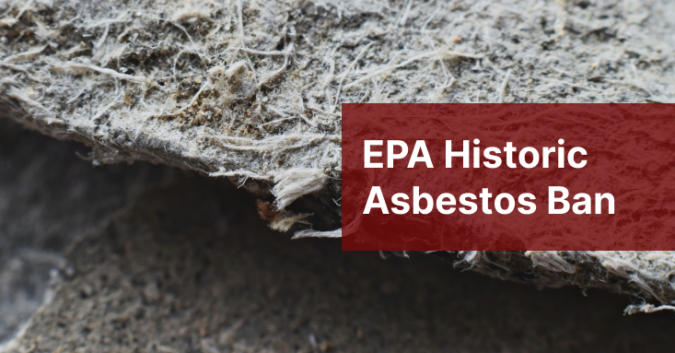On March 18, 2024, the Environmental Protection Agency (EPA) announced its ban on the use of chrysotile asbestos, one of six types of asbestos still in use.
This marks the first time asbestos has been banned in over 30 years, following the EPA’s sweeping ban on asbestos that was passed in 1989 and quickly overturned in 1991.
“The science is clear — asbestos is a known carcinogen that has severe impacts on public health.… The EPA is so proud to finalize this long-needed ban on ongoing uses of asbestos.”
– EPA Administrator Michael S. Regan
With 40,000 people still dying from asbestos-related diseases annually, the EPA’s chrysotile asbestos ban is an important step toward protecting people from this dangerous carcinogen.
As a national mesothelioma law firm, Sokolove Law has helped thousands of families across the country impacted by the devastating effects of asbestos.
Get a Free Mesothelioma Case Review
What Does the EPA’s Chrysotile Asbestos Ban Do?
Under the Toxic Substances Control Act amendments in 2016, the EPA was given more authority to assess and regulate various chemicals, including asbestos.
They found that chrysotile asbestos, one of the six types of asbestos, continued to have “unreasonable risks” despite its limited use in chemical or chlor-alkali manufacturing and other industries.
As a result, the EPA proposed a final rule to ban chrysotile asbestos in 2022. The rule was under review by industry leaders and others in the public before it was finalized.
The March 2024 asbestos ban will:
- Develop workplace safety measures to protect workers while phasing out asbestos
- Halt all imports of chrysotile asbestos immediately
- Require all industries still using asbestos to phase out products in various timelines
“With today’s ban, EPA is finally slamming the door on a chemical so dangerous that has been banned in over 50 countries,” said EPA Administrator Michael Regan.
Each industry still using chrysotile has a unique timeline for completely phasing out asbestos.
Asbestos in sheet gaskets, brake pads, and other auto parts will need to be phased out within 6 months, while manufacturers in the chlor-alkali industry will have between 5 and 12 years to switch to alternatives.
This extended timeline has raised concerns among advocates calling for a complete asbestos ban.
Advocates Call for Stronger EPA Asbestos Regulations & Congressional Action
The Asbestos Disease Awareness Organization (ADAO), which has been leading the fight for a ban on asbestos for years, acknowledged that the EPA’s finalization of the rule is a historic moment to protect workers from exposure.
However, the organization believes the rule does not do enough to combat the widespread dangers of asbestos.
“We are alarmed that the rule allows an unnecessarily long transition period and creates inconsistent compliance deadlines for certain asbestos users, which will allow dangerous exposure to chrysotile asbestos to continue for years to come.”
– Linda Reinstein, ADAO Co-Founder and President
To make matters worse, the current ban only addresses one of six types of asbestos. As a result, the ADAO has called on Congress and other lawmakers to ban all asbestos imports and use by passing the Alan Reinstein Ban Asbestos Now (ARBAN) Act.
The ARBAN Act is the only legislation that proposes a complete ban on all asbestos usage. By passing the bill, Congress could ensure that industries can’t fight or prolong phasing out the toxic mineral.
Fighting for Victims of Asbestos Exposure for Over 45 Years
At Sokolove Law, our mesothelioma lawyers will continue to fight on behalf of innocent victims suffering from illnesses caused by asbestos exposure.
If you or a loved one has an asbestos-related disease, we may be able to help you:
- Access the estimated $30 Billion still available in asbestos trust funds
- File mesothelioma lawsuits to hold negligent asbestos-product manufacturers accountable
- Secure benefits from the U.S. Department of Veterans Affairs if you served
Over the last 45 years, we’ve recovered more than $5.1 Billion in mesothelioma settlements and verdicts for thousands of families nationwide.
Call (800) 995-1212 now or get a free case review to see how we may be able to help you.
